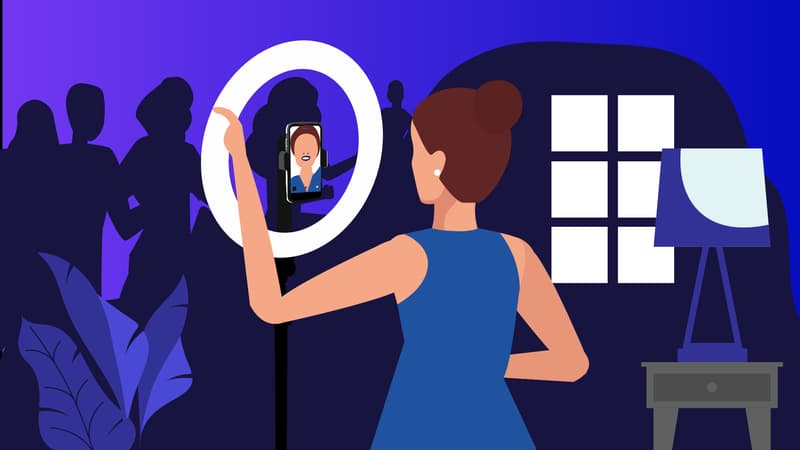Dylan Thiry, Marc Blata, Laurent Billionaire… A small association is behind several procedures aimed at influencers with several million subscribers, suspected of having defrauded their communities. Since 2022, members of the AVI (influencer victim assistance) collective have been working to help victims of these scams.
This Monday they accompany three plaintiffs in the trial against Dylan Thiry, a former reality show candidate suspected of having embezzled money raised in online funds destined for humanitarian missions in Madagascar. In just a few years, the association has been structured and has established itself as one of the main actors in the fight against the excesses of influencers.
Victims gathered to denounce the Blata couple
The AVI collective began in June 2022 by bringing together people who claimed to be victims of scams by influencer couple Marc and Nadé Blata. They felt they had been scammed by investing in financial products promoted by the Dubai-based Blata couple.
Therefore, these victims met to decide the course of action, massively denounce their stories and alert the public. But as the summer progressed, other people contacted them to share their own influencer ad misadventures.
“On August 19, we identified several hundred victims of various influencers and became an association,” explains Mehdi Mazi, co-founder of the AVI collective. This promoter from Ile-de-France was not the victim of an influencer, but says he is “very moved by the damage caused by the commercial ‘advice'” of Marc and Nadé Blata.
About ten volunteers
Today, the group is made up of a dozen people, all of them volunteers, divided into several divisions: victims, legal, communication, public relations and life on social networks.
Inside the victims’ center, Mélissa, 44, collects the words of those who feel wronged. “People send their files to the group’s website and I list them. Then we look at how many people we have in this or that file and see if they can be reimbursed for insurance, if we can file a collective complaint or if we can negotiate amicably with the influencer in question,” he explains. This last option, however, never materialized, according to the person in charge of this ready-to-wear store.
Criticized methods
In the small community of influencer scam whistleblowers, their methods are not unanimous. Sometimes they are criticized for highlighting the people who denounce, giving them, for example, a voice in their lives on network Which Mehdi Mazi fully assumes.
“We are not here to take justice into our own hands. We also want to listen to the authors or co-authors when a victim comes to tell us that there is a conflict with this or that person, with this or that influencer. We can have those answers and in any case that does not prevent us from going to court, it is not incompatible,” he believes.
In 2022, the AVI collective gained notoriety thanks to the support of an artist followed by more than 6 million people in He also participated in several spaces of the association in X. But today, the AVI collective avoids interacting with him publicly.
For months, Booba posted numerous offensive tweets directed at Magali Berdah, whom he accused of deceptive business practices. On October 2, 2023, the rapper was accused of aggravated online moral harassment against the influencer’s agent. He will also be tried on December 3 for racist insults against a journalist and an essayist, as well as for aggravated cyberbullying with respect to the former.
“There are behaviors that we cannot tolerate,” says Mehdi Mazi. “So maybe there was such a distance between Booba and the collective, but it is because he had his line and we had ours,” he adds, although, when Magali Berdah filed a complaint against Booba, the collective transmitted the rapper’s statement communicating its “support.”
“Justice does not happen on the networks”
If the group can also report certain actions of influencers, Mehdi Mazi assures: “justice does not happen on the networks.” For this reason, the association collaborates with several law firms to support victims in their judicial procedures.
In January 2023, two collective complaints were filed against X through the AVI collective, grouping together 88 joint complaints against the activities of Marc and Nadé Blata. Following these complaints, two investigations were opened, related to acts of “organized gang fraud,” which carries up to ten years in prison, “abuse of trust by an organized gang,” and “deceptive business practices.”
Also thanks to the AVI collective, three donors to Dylan Thiry’s humanitarian funds were able to file a complaint for breach of trust. Mélissa, a member of the victims’ center, is one of these complainants. She joined the collective since its creation, in June 2022, after participating in the influencer’s cumulative awards in January.
No fees to pay
For these procedures, victims do not have to pay attorney fees. The group has agreements with several companies that allow them to benefit from reduced or even zero costs in exchange for deals that promise some media coverage. When there are still costs to pay, the group covers them, “self-financing.” Mélissa explains that then, “those who can and want to participate.”
Thanks to these multiple actions, the group has become institutionalized in recent years. To the point of being consulted by public authorities, for example during the hearings of the National Assembly commission on the psychological effects of Tiktok on minors.
The association would like to see the creation of a digital prosecutor’s office, dedicated to crimes committed online, following the model of the national financial prosecutor’s office or the national anti-terrorist prosecutor’s office.
The AVI collective also calls for more resources to be allocated to the fight against these crimes. “We have laws that already exist, but they are not applied,” laments Mehdi Mazi.
Source: BFM TV


